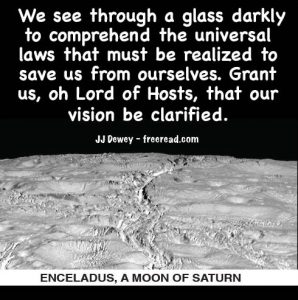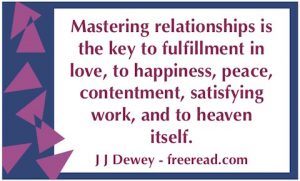
The Mystery of Salvation
Some may wonder about the title of this chapter, thinking that the meaning of salvation is pretty cut and dry. We achieve salvation and go to heaven, right? That seems to be a Course teaching that is in harmony with orthodox Christianity, with not a lot of mystery behind it.
As with many concepts presented in ACIM, there is always more depth than meets the eye. Though it often uses the word as if speaking in a general sense, one must examine the overall presentation to get a clear picture.
For starters, ACIM makes this statement which runs quite contrary to the orthodox view:
“Your Self does not need salvation, but your mind needs to learn what salvation is. You are not saved from anything, but you are saved for glory. T-11.IV.1
To obtain salvation then one must be saved from something, but the Course says we “are not saved from anything.” If this is so, then why does it speak of salvation hundreds of times? If there is nothing to be saved from, why even bring the subject up?
Actually, there is something to be saved from and that something is nothing, or perhaps we should say NO THING. Because we are saved from nothing, the Course tells us we are not saved from anything.
The Course calls this nothing from which we are saved illusions, or the dream within which we seem to find ourselves.
“What is there to be saved from except illusions? And what are all illusions except false ideas about myself?” W-pI.58.3
This illustrates just one of many examples where the reader needs to get a whole picture of what the Course is saying, especially where illusion and true reality are at play, for it often dismisses everything in the dream of separation as if it did not happen. But keep in mind that the comparison is to a dream and the correspondence is enlightening.
When you dream at night and then wake up, you may say to yourself, “that was quite a dream, but it never happened.”
Yes, it is true the dream did not happen in your waking reality, but that doesn’t mean it did not happen within the totality of reality. After all, you did actually have a dream and did have experiences within it. So, from another way of looking at it, the dream did happen. Whether or not you discuss the dream as a real event depends on your reference point.
If the Course’s reference point is heaven, then nothing happens anywhere in time and space. But if the reference point includes time and space, then lots of things are happening.
So, when the Course tells us that we “are not saved from anything,” it speaks from a reference point of eternity in heaven. But then when it turns around and speaks many times of things we need to be saved from, it speaks from a reference that includes the dream of time and space.
This shifting in the Course of the reference point from eternity only to eternity plus time and space produces confusion in students, and causes many to come up with some odd interpretations on various subjects.
Therefore, when reading about salvation, or any other subject, we must look at the context to see where the reference point lies. If it is heaven only, then there is no need for salvation and such a concept is not needed; but if time and space are included, then we have a situation where the Sons of God are trapped in the illusion of the dream state and definitely need to be saved. In this reference the Course asks:
“The question is always twofold; first, what is to be saved? And second, how can it be saved?” T-12.III.2
We have partially answered that question with the statement from the Course about the main thing with which salvation is concerned and that is illusion. (W-pI.58.3) We are caught up in the great dream and need to be awakened as noted by God Himself who the Course quotes as saying: “My children sleep and must be awakened.” T-6.V.1
The illusion is quite complex, and there are many ingredients involved from which we must be saved before we can awaken. Overall, there are four main things that ACIM tells us from which we need to be saved or delivered so awakening can happen.
The first and prime problem is that we must be saved from our false belief about ourselves. While in the illusion we see ourselves as powerless imperfect beings who are at the mercy of outer events which are often beyond our power with which to deal. The Son sees himself as “the victim of this ‘something else,’ a thing outside himself, for which he has no reason to be held responsible.” T-27.VII.1
To escape being a victim, the student must begin to question who he is:
“There is no statement that the world is more afraid to hear than this: ‘I do not know the thing I am, and therefore do not know what I am doing, where I am, or how to look upon the world or on myself.’ Yet in this learning is salvation born. And What you are will tell you of Itself.” T-31.V.17
To this the Course adds: “Again, how simple is salvation! It is merely a statement of your true Identity.” W-pI.77.1 The student must realize: “I am not the victim of the world I see.” W-pI.31
The Course makes it clear that when our true identify is realized that we are not a victim but share in the very powers of our Father God.
God “created you out of Himself, but still within Him.” T-14.IV.4 You are to “accept your rightful place as co-creator of the universe.” W-pI.152.8 “all His extensions are like Him.” T-12.IV.6
Then we have this powerful statement concerning those who realize their true identity:
“There is now no limit on his power, because it is the power of God. So has his name become the Name of God, for he no longer sees himself as separate from Him. (God)” M-23.2
We have all this power, but are asleep and under the illusion that we have no power. What are we to do to manifest our true self and salvation?
“Let us look closer at the whole illusion that what you made has power to enslave its maker. “ T-22.II.9
Thus, the Course acknowledges that the illusion does appear to enslave us. Since our very salvation depends on us waking up to our true reality, the question that needs to be addressed is what stands in our way. There are three main problems the seeker must solve. Let us examine them.
The Problem of Forgiveness
Perhaps the most discussed barrier between separated Sons of God and true reality deals with forgiveness.
The Course gives a somewhat different slant on forgiveness than does orthodox theology. In the standard teaching the one who forgives is seen as a person of superior virtue who overlooks the sins of an inferior person who usually doesn’t deserve it. They see Jesus on the cross as asking to forgive his persecutors but thinking they really deserved to burn in hell.
Concerning this wrong-headed idea of forgiveness, the Course speaks of the “better person” who “deigns to stoop to save a “baser” one from what he truly is. Forgiveness here rests on an attitude of gracious lordliness so far from love that arrogance could never be dislodged. Who can forgive and yet despise? And who can tell another he is steeped in sin, and yet perceive him as the Son of God? Who makes a slave to teach what freedom is? There is no union here, but only grief. This is not really mercy. This is death. … All forms forgiveness takes that do not lead away from anger, condemnation and comparisons of every kind are death.” S-2.II.2&8
“Unjustified forgiveness is attack. And this is all the world can ever give. It pardons “sinners” sometimes, but remains aware that they have sinned. And so they do not merit the forgiveness that it gives.” T-30.VI.3
Therefore, if Jesus had the ACIM attitude of forgiveness when on the cross, he had no thoughts of comparing himself to his enemies and didn’t see himself as superior. He would not have been angry or had the spirit of condemnation at all, where the standard believer trying to forgive may be thinking: “I’ll forgive you SOBs, but you don’t deserve it.”
To this attitude the Course asks: “Who can forgive and yet despise?”
The Course presents us with a radical standard for us to attain. It says:
“Forgiveness recognizes what you thought your brother did to you has not occurred. It does not pardon sins and make them real. It sees there was no sin. And in that view are all your sins forgiven.” W-pII.1.1
To this a skeptic may say: “If a thief steals $100 from me then I am dealing with something that did happen. Aren’t I in denial if I say it did not?”
The answer is that you do not deny anything that has happened from your apparent past, but the key is to see the past in the light of eternal reality. It says this:
“Fear is not of the present, but only of the past and future, which do not exist.” T-15.I.8
The Course tells us the present is the only time there is, and the past only exists as a memory in our minds and is not real from a higher angle of vision.
In other words, if you got hit on the head and lost your memory, then it would be as if the thief had never stolen the $100. For you the present would be all the time there is.
This is the state of mind with which forgiveness must be approached.
We do not deny that in the universe of time and space we have all made mistakes, but the disciple realizes that all such mistakes are in the past and only have reality if the mind decides to give it to them. Instead, the mind can dismiss the past and enter into the eternal Now where salvation leads us. No wonder the Course tells us:
“Salvation and forgiveness are the same.” W-pI.99.1 “Forgiveness is release from all illusions.” T-24.III.1
“He will teach you to remember that forgiveness is not loss, but your salvation. And that in complete forgiveness, in which you recognize that there is nothing to forgive, you are absolved completely.” T-15.VIII.1
So, this attitude of mind creates a tremendous benefit for the seeker. He or she is “absolved completely” and enters a state of innocence as well as “release from all illusions.”
Now some may say there are some offenses just too great to forgive. What if someone raped your sister or killed your parents? You couldn’t just dismiss such things, could you?
It would be difficult, but when the correct attitude of mind is attained it can be done as was demonstrated by Jesus. His spiritual brothers who were supposed to represent kindness and love crucified him. Where others would have cursed them with their dying breaths, Jesus asked God to forgive them. He thus gave us an ultimate example to follow.
If the student can realize one important concept around forgiveness all will come into perspective and make universal forgiveness much easier. It is this: the greater the offense, the greater will be your opportunity to advance toward liberation. Forgiving the thief for stealing the $100 may be a challenge, but most could do it without suffering much sense of loss. On the other hand, forgiving something big like rape or murder takes a lot more presence of mind, but offers a much greater opportunity for moving forward toward salvation or backward into greater illusion.
If one suffers a great offense and forgives as if it did not happen, then he has demonstrated his invulnerability which the illusion normally hides. Thus, the great offense offers a great opportunity.
On the other hand, if he suffers a great offense and allows it to consume him for the rest of his life, he is demonstrating his own perceived vulnerability and enters deeper into the illusion, making awakening more difficult than ever.
Therefore, while caught in the world of illusion, the rule of thumb should be to see all offenses as past illusionary events that can be dismissed, as if they never happened.
I have found this “never happened” idea quite useful in my own life, and when I treat offenses this way it removes their power to affect me in any negative way. It proves its validity by working out in harmlessness and peace through practical application in life.
The Course sums up the importance of forgiveness is this profound quote:
“Forgiveness is illusion that is answer to the rest… Forgiveness sweeps all other dreams away, and though it is itself a dream, it breeds no others. All illusions save this one must multiply a thousandfold. But this is where illusions end. Forgiveness is the end of dreams, because it is a dream of waking. It is not itself the truth. Yet does it point to where the truth must be, and gives direction with the certainty of God Himself. It is a dream in which the Son of God awakens to his Self and to his Father, knowing They are One.” W-pI.198.2-3
The Problem of Grievances
Let us recap where we are with salvation. To obtain salvation we must see through the world of illusion to understand who we really are as Sons of God, but before this can be realized we must forgive all things that could disturb our peace. Just as a lack of forgiveness stands in the way of realizing our true selves, we have several obstacles standing in the way of complete forgiveness.
The first is quite obvious, which is merely a lack of motivation to forgive on the part of the student. The best cure for this is to make a serious attempt to practice it and witness how much peace is attained by it.
However, there are other problems that confront those who are sincerely attempting to live the spiritual life. A master hurdle that must be neutralized is any grievance the seeker has.
We are told in lesson 68 that “Love holds no grievances.” One could also say that forgiveness holds no grievance as well. Then there is this:
“For every grievance is a block to sight, and as it lifts you see the Son of God where he has always been.” W-pI.78.3
The Course tells us clearly that a key to forgiveness is to see the Son of God or Christ in our brothers: “Christ stands before you, each time you look upon your brother.” T-25.V.2 “For as you see the Son you see yourself.”S-2.I.3
The lifting of grievances is essential to forgiveness and remembering who we really are:
“It is as sure that those who hold grievances will suffer guilt, as it is certain that those who forgive will find peace. It is as sure that those who hold grievances will forget who they are, as it is certain that those who forgive will remember.” W-pI.68.3
The lifting of grievances is a key to releasing the light within us:
“your grievances are hiding the light of the world in you, everyone stands in darkness, and you beside him. But as the veil of your grievances is lifted, you are released with him.” W-pI.69.1
It is important to understand that grievances are a key ingredient to a counterfeit plan of salvation:
“The ego’s plan for salvation centers around holding grievances. It maintains that, if someone else spoke or acted differently, if some external circumstance or event were changed, you would be saved… Each grievance you hold is a declaration, and an assertion in which you believe, that says, ‘If this were different, I would be saved.’” W-pI.71.2
“Holding grievances is the opposite of God’s plan for salvation.” W-pI.71.10
“By holding grievances, I am therefore excluding my only hope of salvation from my awareness.” W-pI.86.3
Since a grievance is a powerful obstacle to forgiveness, which in turn is a powerful obstacle to seeing our true reality, it might be helpful to examine the problem more deeply. The Course makes this statement:
“Let me recognize the problem so it can be solved.” W-pI.79
Many do not understand grievances and do not even acknowledge they have them, so the first step is to understand them and learn how to dispel them.
A grievance is basically a negative feeling harbored toward another individual for saying or doing something that is seen as offensive or hurtful. The one offended sees the cause of the grievance as being the fault of another and not himself. The supposed solution is for the other guy to humbly apologize for the offense and to promise not to do it again.
The problem is that many do not take the correct action to solve the problem, the desired apology never comes, and the grievance remains as a festering wound that continues to grow in strength, often to the point of causing physical illness.
Just declaring you forgive the one who offended often does nothing, for a part of you still wants to hear the words “I am sorry” and just can’t let the grievance go. What do you do?
ACIM says, “communication is salvation.” T-15.VII.11 And indeed it is. The one suffering the hurt feelings must communicate with the offender. Taking this step is often very difficult and may require a determined act of will, but this is where the solution lies, and it is quite simple.
The one offended must approach the offender and merely explain to him or her what he did or said to hurt his feelings. The best-case scenario may go something like this:
Bill: When you said ABC it really hurt my feelings. It made me feel like I was a crazy man.”
Ted: Sorry about that. I was just joking around and didn’t mean any harm. I don’t think you are crazy at all.
In cases like this where the communication was made and accepted, the grievance disappears instantly. This is one of the Miracles mentioned in ACIM.
Probably about half the grievances we experience are caused by innocent remarks that are interpreted too seriously. But then there are others more difficult to resolve. In another situation maybe Ted did know what he was doing and wanted to hurt Bill’s feelings. What does Bill do then?
The answer is the same. Communicate.
Even though Ted was intentionally hurtful, there is a good chance his heart will be softened if Bill communicates his feelings sincerely. But even if he refuses to apologize or work things out, Bill will have a chance to get the grievance off his chest. After he has done all he can to resolve the matter, if he is willing, he can then legitimately forgive and let it go. If he does this the miracle of peace will be his. On the other hand, if Ted continues in the attack mode, he will have the negativity of the original grievance rest upon him. It will be as if the dark cloud of grievance was moved from Bill to Ted through the wrong-mindedness of himself.
Fortunately, though, with sincere and honest communication, most grievances can be resolved, and both parties can benefit and obtain peace.
Conclusion: To dispel the grievance honestly, communicate your feelings followed by forgiveness on your part. Then move on as if nothing has happened.
The Problem of Guilt
The final major obstacle to our salvation is guilt, and its negative power over the human spirit cannot be overstated, as it stops the progression of many in their tracks.
ACIM says this:
“Guilt is always in your mind, which has condemned itself.” T-13.IX.6
Notice that it doesn’t say that God, the Holy Spirit or even angels have condemned us, but guilt comes from our own minds which condemn ourselves.
Why in the world would we create so much pain and distress for ourselves as guilt is able to produce? It all boils down to seeing ourselves as having sinned and in need of punishment:
“You can hold on to the past only through guilt. For guilt establishes that you will be punished for what you have done,” T-13.I.8
So why would we condemn ourselves when God does not and “The innocence of God is the true state of the mind of His Son. In this state your mind knows God”? T-3.I.8.
The Course itself answers this question:
“You will not make decisions by yourself whatever you decide. For they are made with idols or with God. And you ask help of anti-Christ or Christ, and which you choose will join with you and tell you what to do.” T-30.I.14
Whether you see yourself as guilty or guiltless is determined by whether your decisions are made through the influence of idols or God, which is like saying the Christ or the anti-Christ.
Indeed, deception by these idols, representing the anti-Christ are the source of guilt:
“There never was a time an idol brought you anything except the ‘gift’ of guilt. Not one was bought except at cost of pain, nor was it ever paid by you alone.” T-30.V.10
Since the idols, representing anti-Christ in this world, are the source of guilt, it then behooves us to understand exactly what an idol is and how it is able to accomplish such a nefarious deception.
An idol is basically a substitute for God. In Bible times people made idols, such as the golden calf, and bowed down and worshipped them. The Course tells us this act is a great error:
“A sick god must be an idol, made in the image of what its maker thinks he is.” T-10.III.4
The question to be considered now is how does an idol bring “the gift of guilt” as taught in the Course? Perhaps an understanding of this is a key to the elimination of this major obstacle.
The main thing that produces guilt is the creation by our minds of a feeling that we have offended God or “sinned” against Him. To the contrary, the Course teaches that we are in a dream state and nothing we do here is real enough to offend God.
If guilt does not come from sinning against God, then where does it come from?
It comes from sinning against an idol, a substitute for God.
And where do we find such substitutes?
They are everywhere. Many there are who get in line to be your idol or voice of God from without rather than the true God which is contacted within.
In a religion or spiritual group, the voice of the outer god comes to you from your religious authorities, scriptures or books. If such an outer voice speaks for God and you accept it, then a violation of the word is interpreted as a sin against God which is followed by guilt.
If this outer voice from an accepted idol tells you to not drink coffee, dance, or go to certain movies and you violate the order, your mind will see it as a sin and you will feel guilt.
Another person who does not see such commands as coming from God will feel no guilt whatsoever.
The difference is that one is being controlled by an idol representing an outer authority and the other is not – at least in this area of living. ACIM says this:
“The authority problem is still the only source of conflict, because the ego was made out of the wish of God’s Son to father Him.” T-11.in.2
Idols, or authoritative substitutes for the true inner voice of God, are everywhere and few escape the guilt they produce. Idols are found in not only religious leaders, but parents, family members, political, sports, entertainment and many other groups. Even hardened atheists accept idols that nurture their guilt.
But here’s the strange thing, and the hidden cause of much residual guilt. Even the text of the most holy and accurate words on earth can become an idol that substitutes for God and can create guilt. Yes, even the words in the Bible or A Course in Miracles can become an idol that lead the mind away from the true God to a false outer one.
The problem is that words themselves are an imperfect substitute for the perfect word that comes from the Inner Voice. The Course says:
“Words can be helpful, particularly for the beginner, in helping concentration and facilitating the exclusion, or at least the control, of extraneous thoughts. Let us not forget, however, that words are but symbols of symbols.” M-21.1
Then we have this from the Voice of ACIM: “I have made every effort to use words that are almost impossible to distort, but it is always possible to twist symbols around if you wish.” T-3.I.3
So the greatest and purest words from the Bible, the Course or any sacred writing can be interpreted incorrectly, and if the student accepts their words as infallible literal truth he may suffer guilt through the illusion produced.
This problem is obvious when we see that there are hundreds of religions who interpret the simple words of Jesus in the Bible hundreds of different ways. A Course in Miracles is very straightforward in what it attempts to say, but even here many students disagree with each other about its meaning. The truth is that taking in the black-and-white words as infallible words from Jesus or God creates an idol. To escape this control of an outer god the seeker must always rely on a connection with the inner God through the Holy Spirit, as taught in the Course. Then the student can read any outer words and not be led into the trap of guilt. He will then be able to find more truth in the National Enquirer than one who is in illusion can find in the Bible.
To escape from guilt, the seeker must first realize that the inner Voice never condemns, but the outer voice does. If he feels any guilt at all, then this is a sign that he has been deluded into accepting the idol of an outer god who has falsely taken the place of the true Inner One. What he must do next is to identify the outer god to whom he has given power to control him with guilt.
Sometimes this idol is obvious and other times it is not. If he is a member of an authoritarian religion, then it is most likely that it is the religious authorities and teachers who have taught him how he is to feel guilty.
On the other hand, there are those who have tried to leave an orthodox religion behind and think they are free, but are not. The authoritative decrees still echo in their minds and have power to produce guilt.
Then for some it is more subtle still. An infallible acceptance of scripture or even A Course in Miracles followed by distorted black-and-white interpretations can create a false god, even out of the best of the world’s symbolic words. If the seeker gives the black-and-white words more authority than the Inner Voice or ignores the Inner in favor of the outer, then the student will suffer guilt.
Accepting this in theory is not enough. The student must take action to identify the source of guilt and dismiss it. When guilt comes, he can say to himself: “The true God does not condemn. Where then is this condemnation coming from? I will identify it and let it be as if it never was. I refuse to be deceived any longer.”
When the seeker truly finds the source of guilt, dismisses it, and commits to following the Holy Spirit within no matter what the outer voices seem to say, then in that instant guilt will just evaporate and be no more. Never again will the pilgrim have to suffer from guilt.
To this some may ask if it is not necessary to have a certain amount of guilt. After all, do we not need a conscience to guide us on the right path?
This illusionary idea is a final hurdle that must be handled to neutralize guilt completely. Our true conscience does not condemn and has nothing to do with guilt. Guilt is produced by a supposed sin that is committed, but the word “sin,” as was used in the days of Jesus, was much different than how it is used to induce guilt today.
The word “sin” in the New Testament comes from the Greek word HAMARTANO which means “to miss the mark.” In other words, when the Greeks, 2000 years ago, shot at a target with an arrow and missed, they “sinned” (HAMARTANO) or missed the target. Is this how the word “sin” is used today? Verily, no. When the religious person thinks of sin in our age, he generally thinks of being unclean and ridden with guilt.
When you shoot at a target and miss the bull’s eye, do you feel degraded and guilty to the extent that you feel paralyzed and even feel unworthy to shoot again? No, of course not. When you miss you may find it mildly irritating, but you generally can’t wait to have another try at it.
On the other hand, if the archer were to feel guilty, he would not consider himself worthy to shoot again until he has paid some price for redemption.
We would laugh at any sportsman with this crazy idea, yet that is how the ego manipulates us with guilt in our lives, and most find it no laughing matter.
Guilt has been identified with sin by those who have sought to control the souls of men, but among the enlightened prophets it was not always so. To them, sin was seen as a human error and salvation from sin was the path that leads to a correction of error. The prophets in times past did not seek to control through guilt, but sought to shift consciousness from error to perfection as they saw it.
The most prevalent sin today (using its true definition) is to be ensnared by guilt, for guilt is caused, not by your conscience, but by an error in human thinking.
It is indeed a great error to make a mistake and then condemn yourself through guilt to the extent that you become paralyzed and do nothing to fix the problem until you feel worthy again. When a mistake is made, the seeker needs to jump right back in making an effort to correct himself.
Indeed, the idea of correction of error rather than sin is a threat to the ego:
“Any attempt to reinterpret sin as error is always indefensible to the ego. The idea of sin is wholly sacrosanct to its thought system, and quite unapproachable except with reverence and awe. It is the most “holy” concept in the ego’s system; lovely and powerful, wholly true, and necessarily protected with every defense at its disposal. For here lies its ‘best’ defense, which all the others serve. “ T-19.II.5
The diligent ACIM student will defy the ego and again see sin as mere error as was its interpretation in the days of Jesus.
Let us conclude then by itemizing the basic ingredients of salvation. First, the Course makes salvation sound like the simplest thing in the world. All we need to do is recognize who we really are and act accordingly. Then there’s a big “but.” There are three main roadblocks that take our vision away from our true reality. They must be mastered before this simple true vision can come. The student must forgive, let go of grievances and finally completely neutralize guilt and let it go back to the nothingness from whence it came.
When these steps are taken, he is said to be saved from living in the illusion of who he is NOT rather than who he IS.
Does this mean the journey is over and the seeker has entered heaven?
Not quite, though it will seem like heaven by comparison as he has established a solid link with God through the Holy Spirit. But…
“Salvation stops just short of Heaven, for only perception needs salvation.” T-26.III.5
If salvation stops short of heaven, then what is missing? Here is the answer:
Salvation is nothing more than “right-mindedness,” which is not the One-mindedness of the Holy Spirit, but which must be achieved before One-mindedness is restored.. T-4.II.10
Salvation takes us to right-mindedness, stopping short of the goal of one-mindedness which is the awareness that exists in eternity. The Course tells us what it means by right-mindedness:
“The term ‘right-mindedness’ is properly used as the correction for ‘wrong-mindedness,’ and applies to the state of mind that induces accurate perception.” T-3.IV.4
We achieve salvation through accurate perception and the most important things to perceive accurately are forgiveness, grievances and guilt leading us to an understanding of who we are.
So, where does this salvation take us?
“How much do you want salvation? It will give you the real world, trembling with readiness to be given you.” T-17.II.7-8
“Salvation is a borderland (real world) where place and time and choice have meaning still, and yet it can be seen that they are temporary, out of place, and every choice has been already made.” T-26.III.3
Salvation is not the end of our journey, but it does take us to the real world which is the final step before our final atonement and liberation.
“The real world still is but a dream. Except the figures have been changed. They are not seen as idols which betray. It is a dream in which no one is used to substitute for something else, nor interposed between the thoughts the mind conceives and what it sees.” T-29.IX.7
Arriving at the real world leads to the final step:
“When you perceive yourself without deceit, you will accept the real world in place of the false one you have made. And then your Father will lean down to you and take the last step for you, by raising you unto Himself.” T-11.VIII.15
Copyright by J J Dewey
Read the Introduction HERE, Read Chapter One HERE. Chapter Two HERE, Chapter Three HERE, Chapter Four HERE, Chapter Five HERE Chapter Six HERE, Chapter Seven HERE, Chapter Eight HERE, Chapter Nine HERE, Chapter Ten HERE, Chapter Eleven HERE, Chapter Twelve HERE, Chapter Thirteen HERE, Chapter Fourteen HERE, Fifteen HERE, Sixteen HERE, Seventeen HERE, Eighteen HERE, Nineteen HERE, Twenty HERE, Twenty-One HERE, Twenty-Two HERE, Twenty-Three HERE, Twenty-Four HERE, Twenty-Five HERE, Twenty-Six HERE, Twenty-Seven HERE, Twenty-Eight HERE, Twenty-Nine HERE, Thirty HERE
ACIM Conversations, Part 1, Part 2, Part 3, Part 4, Part 5, Part 6, Part 7, Part 8, Part 9, Part 10, Part 11, Part 12, Part 13, Part 14, Part 15, Part 16, Part 17, Part 18, Part 19, Part 20, Part 21, Part 22, Part 23, Part 24, Part 25






